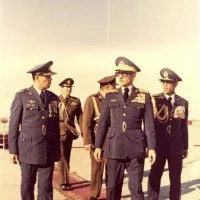Recent disagreements over Beijing’s claim to the South China Seas (in which a tribunal constituted under the UN Convention on the Law of the Sea issued a non-binding decision in July 2016 in favor of the Philippines) in many ways is reminiscent of the potentially far more serious clashes over the Taiwan Straits, the first of… Read More "China’s Fight for Tiny Islands — The Taiwan Straits Crises, 1954-58"
Mohammad Reza Pahlavi, the Shah of Iran, departed Tehran on January 16, 1979 to seek medical treatment and to escape growing political unrest in the country he ruled. The Shah had consolidated his hold on power after the 1953 U.S.-backed overthrow of Mohammad Mossadegh and was considered a vital ally to the U.S., a leader… Read More "Finale of the Persian Monarchy and Prelude to the Iranian Revolution"
Persistence, Vision and Luck: Creating a Center for Diplomatic Training
Can you imagine the bureaucratic struggles involved in persuading the Department of Defense to hand over acres of prime real estate for a State Department training facility and then convincing Congress to authorize the transfer? This impossible dream was accomplished thanks to vision, persistence and a large dose of luck by a small group of… Read More "Persistence, Vision and Luck: Creating a Center for Diplomatic Training"
Bad Blood: The Sino-Soviet Split and the U.S. Normalization with China
In the 1960s, in the depths of the Cold War, the world was viewed in terms of a zero-sum game: wherever the USSR won, the U.S. by definition lost. The People’s Republic of China (PRC), despite its massive size, was considered to be the Soviets’ little brother and thus not a real player. The State… Read More "Bad Blood: The Sino-Soviet Split and the U.S. Normalization with China"
When Friends Spy on Friends: The Case of Jonathan Pollard
Former Navy intelligence analyst Jonathan Jay Pollard delivered over 800 highly classified documents to the Israeli government over a 17-month period. According to an article by Seymour Hersh published in the New Yorker, Pollard stole and sold militarily sensitive Signals Intelligence information, a year’s worth of memos by intelligence officers in the U.S. Navy’s Sixth… Read More "When Friends Spy on Friends: The Case of Jonathan Pollard"
East Germany Builds the Berlin Wall
The summer of 1961 was fraught with tensions between Moscow and Washington. Berlin, which had been a Cold War flash point during the Berlin Airlift, was once again the source of tension. Between 1949 and 1961, some 2.5 million East Germans fled from East to West Germany, most via West Berlin. President John Kennedy in… Read More "East Germany Builds the Berlin Wall"
Jesse Helms: The Senator Who Just Said No
Jesse Alexander Helms, a five-term Republican Senator (1973- 2003) from North Carolina, was known not only for his conservative beliefs but for the lengths he would go in support of them. A proponent of the conservative resurgence movement in the 1970s, Helms cherished his nickname: “Senator No,” granted for his obstructionist tendencies. As a member… Read More "Jesse Helms: The Senator Who Just Said No"
The Extra Special Relationship: Thatcher, Reagan, and the 1980s
The “special relationship” between the United States and the United Kingdom has served to unite the two nations over the past century. Thanks in part to a shared language, historically common enemies and similar political structures, leaders of the two countries have found it easier than most to achieve common objectives around the world. Perhaps… Read More "The Extra Special Relationship: Thatcher, Reagan, and the 1980s"
The Neutron Bomb — A Negotiating Dud
The neutron bomb, a low-yield thermonuclear weapon which would be especially lethal to enemy ground troops but would not seriously damage buildings, became the focus of international controversy when the U.S. and a few others had proposed deploying the weapon in Western Europe to counter the Soviet threat. Many NATO countries were unwilling to accept… Read More "The Neutron Bomb — A Negotiating Dud"
Modern Turkey’s History of Military Coups
The July 2016 attempted coup d’état in Turkey was the latest in a series of military interventions in the nation’s history. The military has forced out four civilian governments since 1960, when Premier Adnan Menderes was deposed. In 1971 the military forced Prime Minister Suleyman Demirel to resign; in 1980, the Turkish army launched the… Read More "Modern Turkey’s History of Military Coups"

